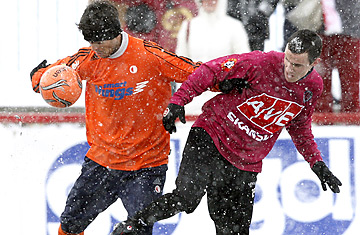
Prague-based Slavia defeated Ceske Budejovice 3-2 in the Tipsport Cup.
When No. 10 got back on his feet, chest-bouncing the football toward his fellow players, his teammates rewarded him with loud "well done" cheers, as if he had come off with an unexpected triumph. "He plays well. But in summer," sniped 59-year-old Antonin Votruba, shaking his woolen pompom-topped red-white club hat. His buddies nodded knowingly. No. 10 himself misses the warm weather.
No. 10 is Rogerio Marcio Botelho, 27, and his life a case study in the game gone global. Botelho, nicknamed Gaucho after former Brazilian national-team player Renato Gaucho, is one out of some 850 Brazilians professionally chasing football outside their homeland. These days his friends play for clubs in places like Azerbaijan, Armenia and Vietnam. "How was it today?" I ask as Gaucho steps out of the dressing room in a white turtleneck and a brown winter coat. He rolls his deep brown eyes. Then, his handsomely chiseled features warm up in disarming laughter. "I try. I give all myself. But I can't," he says, alluding to the ordeal of European winter. "I must do it. I am a professional. But I hate it." He has worn three layers of clothing at times in order to keep warm. In his years in Eastern Europe, he has developed one exhausting method to outpace chilly temperatures. He explains: "I run, I can't stop."
Gaucho's Eastern European career has been a bit of a roller-coaster ride. In Bulgaria, he played for Levski, a Sofia-based club then owned by a Russian oligarch named Michael Chorny who, at the time, was banned from setting foot on Bulgarian soil because of alleged ties with organized crime. A big star in Sofia, Gaucho threw a tantrum after a coach replaced him in an important UEFA Champions League qualification match. He picked up his brother and a bottle of Jack Daniels and disappeared for a week, leaving reporters to speculate about his whereabouts. (He had retreated to the seaside resort of Varna.) "It was a scandal," he says.
His next tour took him to the Russian city of Samara. There, aside from "drinking like mad," Gaucho learned something about xenophobia and racism. "For me the color is not a problem," he says in the mostly present-tense English he picked up from a former teammate from Costa Rica. "Africans had a problem [in Russia] and I had a problem because I was with the African guys." He adds: "I have some stories to tell my son."
Compared to Russia and Bulgaria, Gaucho says the Czech Republic is a breeze. His troubles have shrunk to figuring out where to go fishing, his favorite pastime. In Prague, he is tilting at bureaucratic windmills in order to angle a fishing permit. He used to fish in the Czech town of Olomouc, where he played with another team. But in all the time he spent at the local river there, he managed to catch only "one trout and a karpyonka [Russian for carp]." He is mystified about the kind of bait Eastern European fish prefer. "I don't know what they eat here. I try sausage, popcorn, but they don't eat."
When he gets back to Brazil, he hopes to move his young family of three to the countryside, someplace where he can own a boat and go fishing. "I always say this, I hope I can be in Brazil," he says. And then his homesick expression gives way to yet another hearty laugh. "But maybe I go to China."
